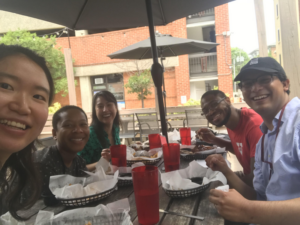APSA Diversity Committee
Current Members
- Janet Arras, PhD (Med 3)
- Jesse Cochran (Med 2)


- HeeJin “Kate” Cheon, PhD (Med 3)
- Michael Kovacs (Grad 5)
- Kimberly Nguyen (Med 2)
- Gustavo Pacheco (Grad 3)
- Isaiah Swann (Med 2)
- Zollie White III (Grad 6)
- Briana Wilson (Grad 5)
Contact us: mstp@virginia.edu; Want a student perspective? Contact bw9bj@virginia.edu
Educational Material
As educational material is developed for Clinical Skills Night, the pre-reading information will be uploaded with hyperlinked references highlighting relevant literature for the specific health disparities topic.
- Race-related disparities in pain assessment and management: Race-related disparities in pain assessment and management
- Transportation Barriers: A Social Determinant of Health for Cardiovascular Disease and Other Health Conditions: Transportation Barriers to Health Care
- Race in Spirometry: Race Correction in Diagnostic Tests and Risk Calculators
- UVA History: From a Black Perspective (by Nadine Michel, UVA MSTP 2022 Alum): https://www.tiki-toki.com/timeline/entry/1446213/UVA-History-From-a-Black-Perspective/
Student Voices
Why is diversity important to you?
“Diversity is essential to the generation of novel questions and identification of approaches to answer those questions. Our own experiences bias us towards solutions we have used in the past for current problems, but diversity allows the synthesis of many experiences to drive new and creative solutions that have not been explored.”
“Diversity creates a positive environment of collaboration that facilitates the development of new ideas.”
“Varied opinions, backgrounds, experiences, ideas coming together to coexist and give fair voice to. It adds richness to any endeavor, personal or scientific.”
“Indicates that a place will be welcoming to me!”
“Diversity provides us a wealth of perspectives and approaches to tackle the social inequities that prevent us from achieving a compassionate and just society.”
“To ensure adequate representation, and to make sure that different voices and opinions are heard.”
“I firmly believe that people of all identities can contribute meaningfully to science and medicine, and should therefore be given access to medical education.
Beyond this, having diverse colleagues enables me to learn new perspectives. From friends and colleagues from different backgrounds, I have learned about the unique challenges they have faced and skills they have gained. I am continually learning, and I make mistakes. It can be more comfortable to exist in an “echo chamber” of like-minded peers with similar backgrounds, but I have learned so much from my good friends who come from other countries, socioeconomic backgrounds, religions, races, sexual orientations, etc. I have learned to question many assumptions I used to have about how “everyone” does things.
I think a program with diverse students and faculty helps build empathy and reduce implicit bias. It is unfortunately easy to see minorities as “other” if one’s experience is limited to interacting with people who share their background. Working with diverse colleagues helps expand a person’s worldview and trains them to see ALL humans as whole individuals, and not simply as an identity “label”.
Together with training to reduce implicit bias and discrimination, the presence of voices from all backgrounds can help improve the practice of science and medicine.
Finally, a diverse program helps to recruit diverse students, and helps them feel more at home when they decide to join. It’s not feasible to include representations of “every” aspect of diversity within a program at all times, but seeing a population that is not homogeneously of a single identity probably helps all applicants feel like they could be welcomed and find a home in our program.”
“The only way for us to do right by our community is if we are representative of our community. It builds trust, and it shows that we care that those both in charge and those delivering care have roots throughout all parts of our community. Diversity in our medical school class, in our healthcare team, in the hospital in general, means we are giving every group, including those that have been — and continue to be — marginalized, a voice and say in how to best serve our city.”
“Simply put, because it is fair and just. When science and medicine welcome people from all backgrounds, everyone benefits, including our patients. Our conversations and actions to promote diversity have made me wiser and more perspicacious.”
To learn more about the committee & their work, visit the following pages:
